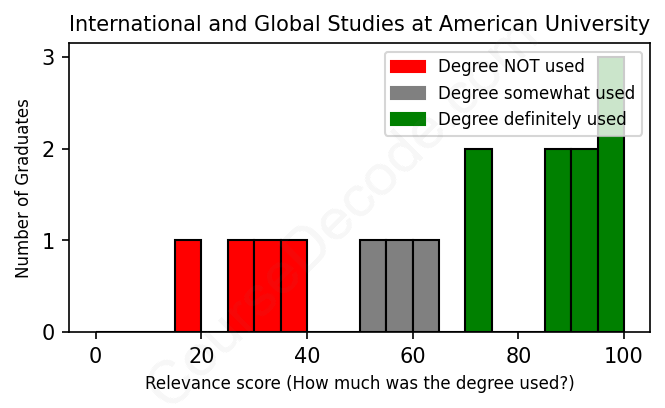
First, some facts. Of the International and Global Studies graduates from American University we've analyzed , here's how many have used (or NOT used) their degree in their career:

These are estimates based on AI analysis of 16 LinkedIn profiles (see below).
The verdict? On par with the average. Overall, with an average relevance score of 67%, International and Global Studies graduates from American University have about the same likelihood of finding work in this field as the average graduate across all fields:
And for comparison, here's the chart for all profiles we've looked at across all degrees.
Also, after graduating, 50% of these graduates have pursued further education other than another Bachelor's degree (such as a Masters degree or other), compared to the average across all profiles of 35%. This suggests you may need more than just a Bachelors degree to be competitive as a International and Global Studies graduate.
See the details:
|
Relevance score: 53% We think this person has gone into a career only somewhat relevant to their degree. We think this person has gone into a career only somewhat relevant to their degree.
DEGREE INFOGraduated in 2020 from American University with a Bachelor of Arts - BA in International and Global Studies. Also pursued further education since (see below). JOB HISTORY SINCE GRADUATIONCorrespondent-Internship The Organization for World Peace Jan 2020 - May 2020 Member Service Representative  Military Officers Association of America (MOAA) Jul 2020 - Oct 2022 Chapter Affairs Specialist  Military Officers Association of America (MOAA) Oct 2022 - Present FURTHER DEGREES DONE SINCE GRADUATINGMaster of Science - MSAmerican University 2022 - 2023 ABOUTNo information provided. |
The top 10 most common jobs done by the graduates we've analyzed (ranked most common to least) are:
From analyzing the LinkedIn profiles of graduates with a degree in International and Global Studies from American University, it seems like a significant number have pursued careers in government and consulting roles. Many have had internships and full-time positions within organizations like the U.S. Senate, FEMA, and various consulting firms where their work often involves global policy analysis or international relations. Jobs like legislative intern positions and consultants in federal agencies typically align closely with the International and Global Studies curriculum, suggesting that many graduates do find relevance in their fields of work.
However, not all careers taken by graduates are directly related to International and Global Studies. Some graduates have moved into fields like culinary arts, or administrative roles, which don’t really utilize the specialized knowledge from their degree. Much of the consulting work, while it may touch on international matters, often leans heavily towards business practices. Overall, while there are solid connections for many graduates to their fields of study, there's also a noticeable amount of divergence, with some winding up in roles that are only tangentially related to international studies. So, it can be a mixed bag depending on individual career choices and the paths they decide to take after graduation.
Here is a visual representation of the most common words in job titles for International and Global Studies graduates (this is across all International and Global Studies graduates we've analyzed, not just those who went to American University):

So, if we take a look at what graduates from American University with a degree in International and Global Studies have been up to, we can see some interesting patterns. For many, the first jobs straight out of college often come in the form of internships or entry-level roles in government, nonprofits, or consulting firms. This reflects a natural progression for those interested in making an impact in global issues, public policy, or international relations. For instance, some graduates landed positions as Legislative Interns or with organizations focused on global issues soon after graduation. But as they gain experience, many seem to transition into more specialized roles in consulting or even leadership positions in various organizations, like becoming a Program Manager at FEMA or a Director of Strategic Initiatives at a law firm.
Looking five to ten years down the road, it seems a good chunk of these alumni have managed to climb up the career ladder fairly well. While some have branched out into unrelated fields, like culinary arts or Human Resources, a solid number remain in roles that align with their degree, working in government agencies, consulting firms, or global organizations. Others have transitioned into roles that leverage their analytical skills, such as Project Managers or Analysts in different sectors. Overall, graduates of the program have a mix of outcomes, with many finding rewarding careers that connect back to their studies in international and global issues, while some have taken creative detours. So, it's a mixed bag, but overall, it looks like there are definitely viable career paths for those with this degree.
Getting a Bachelor’s degree in International and Global Studies, whether at American University or somewhere else, can be a bit of a mixed bag. It definitely has its challenging moments, especially if you're diving into complex global issues, politics, and cultural studies, which require a lot of critical thinking and analysis. There are generally a lot of readings, research papers, and group projects involved, so if you’re not into keeping up with current events or diving deep into different cultures, it might feel overwhelming at times. However, for those who are passionate about the subject and enjoy connecting the dots between global events and local impacts, it can be really rewarding and might even feel easier. Overall, it’s about average in difficulty—it’ll push you, but it’s definitely manageable if you keep up with your work and stay engaged!
Most commonly, in the LinkedIn profiles we've looked at, it takes people 3 years to finish a Bachelor degree in International and Global Studies.
Looking at the job trajectories of these International and Global Studies graduates from American University, it seems like some of them are doing pretty well financially, especially those who landed consulting roles or positions in the Navy and FEMA, where salaries tend to be higher. The first grad, with a steady climb to Director and then military officer roles, likely rakes in a decent salary. However, others, especially those who started in more unconventional paths like cooking or teaching, might not be pulling in quite as much, though owning a restaurant could swing that around if it does well. Overall, there’s a mix here: some seem to be on the path to comfortable earnings, while others might be feeling the pinch a bit more. It really depends on the industry and role!
Here is a visual representation of the most common words seen in the "about" section of LinkedIn profiles who have a Bachelor degree in International and Global Studies (this is across all International and Global Studies graduates we've analyzed, not just those who went to American University). This may or may not be useful:

Here are all colleges offering a Bachelor degree in International and Global Studies (ordered by the average relevance score of their International and Global Studies graduates, best to worst) where we have analyzed at least 10 of their graduates:
| College | Score | Count |
|---|---|---|
 American University American University
|
67 | 16 |
 University of North Carolina at Chapel Hill University of North Carolina at Chapel Hill
|
61 | 13 |
 UC Santa Barbara UC Santa Barbara
|
49 | 14 |
 University of Utah University of Utah
|
46 | 10 |
 University of California, Santa Barbara University of California, Santa Barbara
|
41 | 11 |